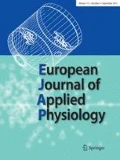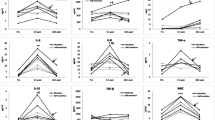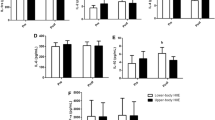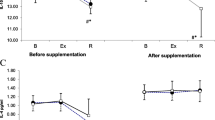Abstract
Strenuous exercise may be associated with immune suppression. However, the underlying mechanism is not known. A decrease in the plasma level of glutamine, which is utilised at a high rate by cells of the immune system, and an increase in the plasma level of some cytokines may impair immune functions such as lymphocyte proliferation after prolonged, exhaustive exercise. In two separate studies of the Brussels marathon, using similar protocols, the time course of the changes in the plasma concentrations of some amino acids (glutamine, glutamate, alanine, tryptophan and branched chain amino acids), acute phase proteins and cytokines (interleukins IL-1α, IL-2, IL-6, tumour necrosis factor type a) was measured in male athletes. The numbers of circulating leucocytes and lymphocytes were also measured. Amino acid and cytokine concentrations have not previously been measured concomitantly in marathon runners; the measurement of some of these parameters the morning after the marathon (16 h) is novel. Another novel feature is the provision of glutamine versus placebo to marathon runners participating in the second study. In both studies the plasma concentrations of glutamine, alanine and branched chain amino acids were decreased immediately after and 1 h after the marathon. Plasma concentrations of all amino acids returned to pre-exercise levels by 16 h after exercise. The plasma concentration of the complement anaphylotoxin C5a increased to abnormal levels after the marathon, presumably due to tissue damage activating the complement system. There was also an increase in plasma C-reactive protein 16 h after the marathon. The plasma levels of IL-1α were unaffected by the exercise, while that of IL-2 was increased 16 h after exercise. Plasma IL-6 was increased markedly (≈ 45-fold) immediately after and at 1 h after exercise. Neopterine, a macrophage activation marker, was significantly increased post-exercise. There was a marked leucocytosis immediately after the marathon, which returned to normal 16 h later. At the same time there was a decrease in the number of T-lymphocytes, which was further reduced within 1 h to below pre-exercise levels. Glutamine supplementation, as administered in the second study, did not appear to have an effect upon lymphocyte distribution.
Similar content being viewed by others
Author information
Authors and Affiliations
Additional information
Accepted: 20 June 1996
Rights and permissions
About this article
Cite this article
Castell, L., Poortmans, J., Leclercq, R. et al. Some aspects of the acute phase response after a marathon race, and the effects of glutamine supplementation. Eur J Appl Physiol 75, 47–53 (1996). https://doi.org/10.1007/s004210050125
Issue Date:
DOI: https://doi.org/10.1007/s004210050125




